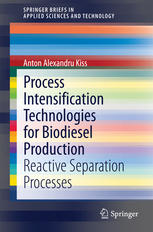

Most ebook files are in PDF format, so you can easily read them using various software such as Foxit Reader or directly on the Google Chrome browser.
Some ebook files are released by publishers in other formats such as .awz, .mobi, .epub, .fb2, etc. You may need to install specific software to read these formats on mobile/PC, such as Calibre.
Please read the tutorial at this link: https://ebookbell.com/faq
We offer FREE conversion to the popular formats you request; however, this may take some time. Therefore, right after payment, please email us, and we will try to provide the service as quickly as possible.
For some exceptional file formats or broken links (if any), please refrain from opening any disputes. Instead, email us first, and we will try to assist within a maximum of 6 hours.
EbookBell Team

4.7
106 reviewsThis book is among the first to address the novel process intensification technologies for biodiesel production, in particular the integrated reactive separations. It provides a comprehensive overview illustrated with many industrially relevant examples of novel reactive separation processes used in the production of biodiesel (e.g. fatty acid alkyl esters): reactive distillation, reactive absorption, reactive extraction, membrane reactors, and centrifugal contact separators. Readers will also learn about the working principles, design and control of integrated processes, while also getting a relevant and modern overview of the process intensification opportunities for biodiesel synthesis.
Biodiesel is a biodegradable and renewable fuel that currently enjoys much attention. In spite of the recent advances, the existing biodiesel processes still suffer from problems associated with the use of homogeneous catalysts (e.g. salt waste streams) and the key limitations imposed by the chemical reaction equilibrium, thus leading to severe economic and environmental penalties. The integration of reaction and separation into one operating unit overcomes equilibrium limitations and provides key benefits such as low capital investment and operating costs. Many of these processes can be further enhanced by heat-integration and powered by heterogeneous catalysts, to eliminate all conventional catalyst related operations, using the raw materials efficiently and the reaction volume, while offering high conversion and selectivity, and significant energy savings.
The targeted audience of this book includes both academia (students and researchers) and industry (project leaders, technology managers, researchers, biodiesel producers, and equipment suppliers).